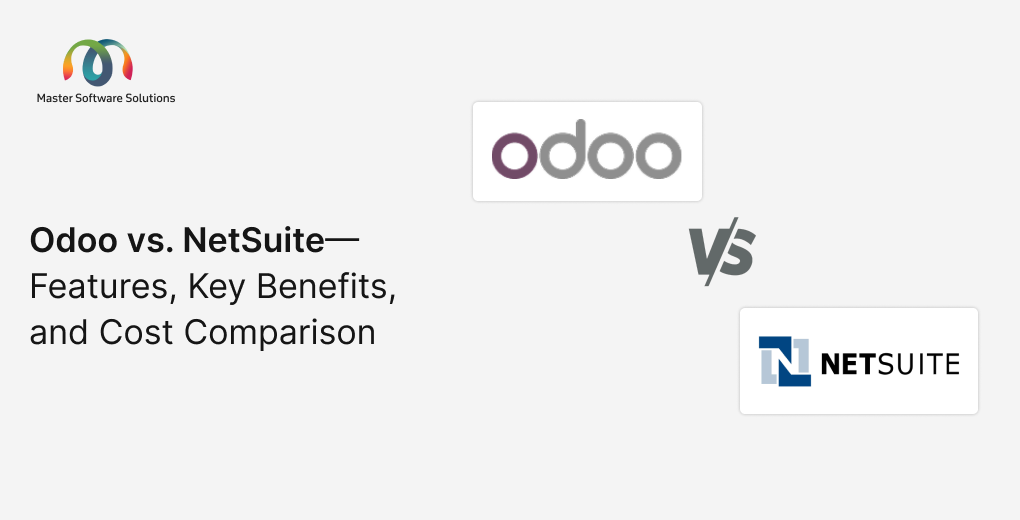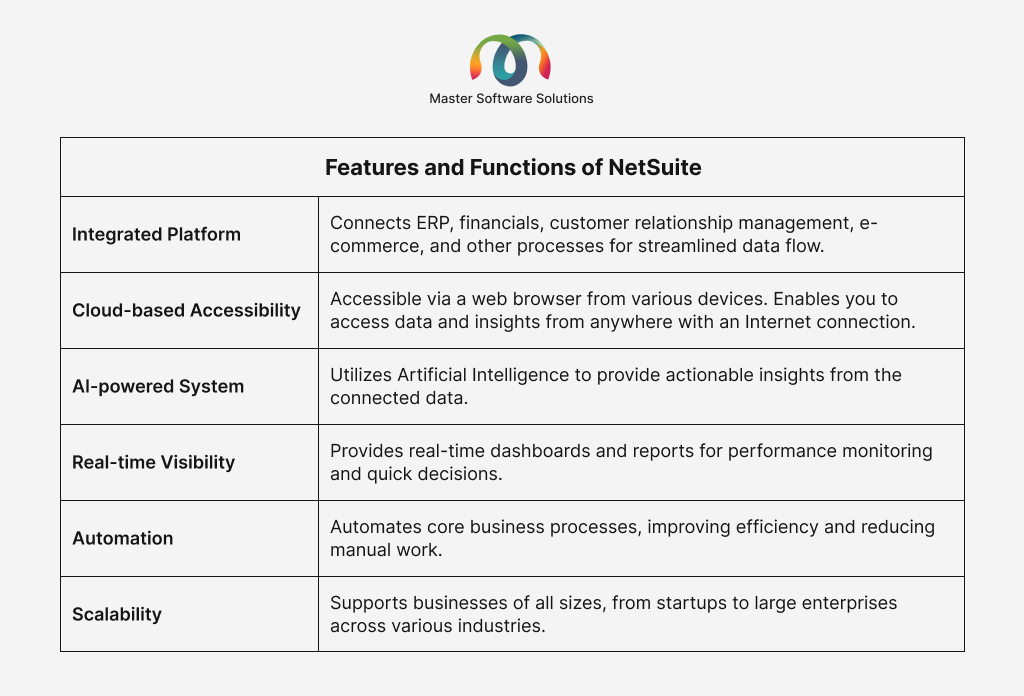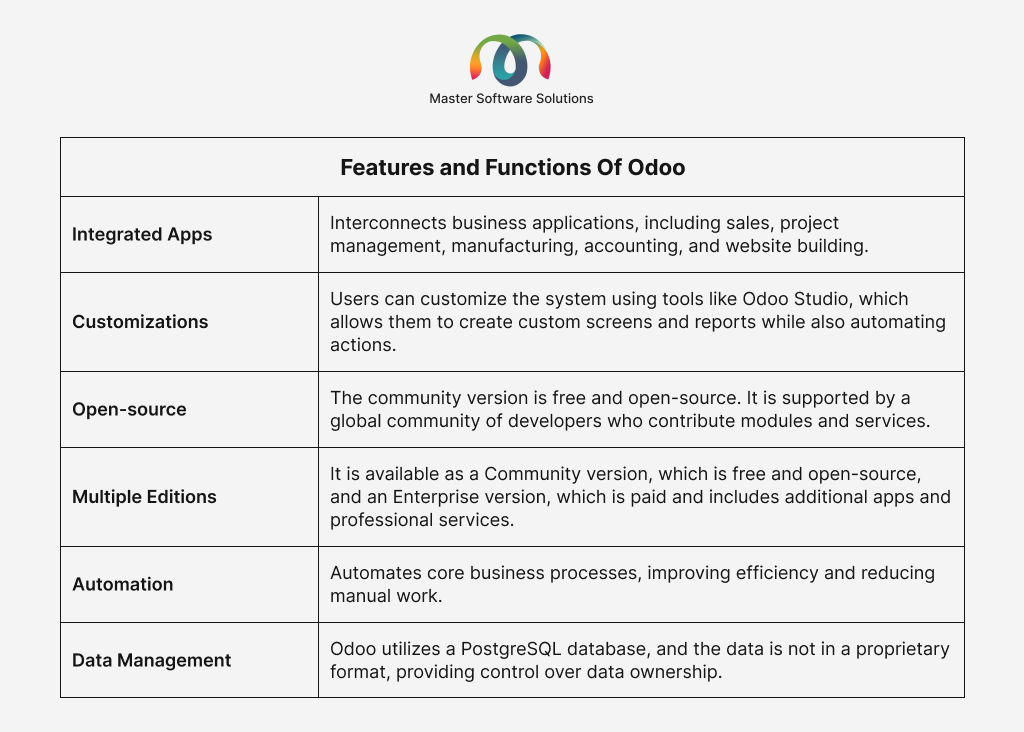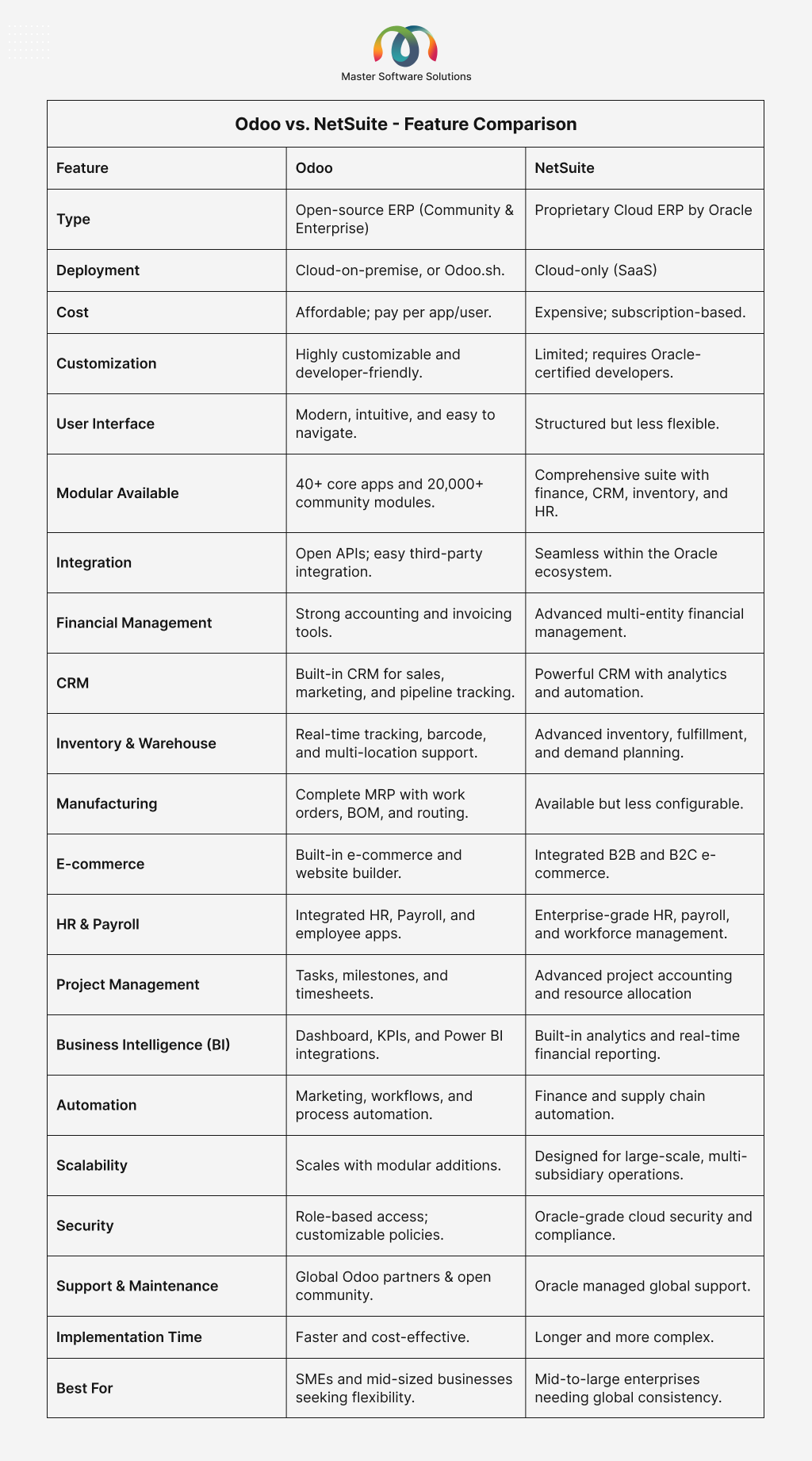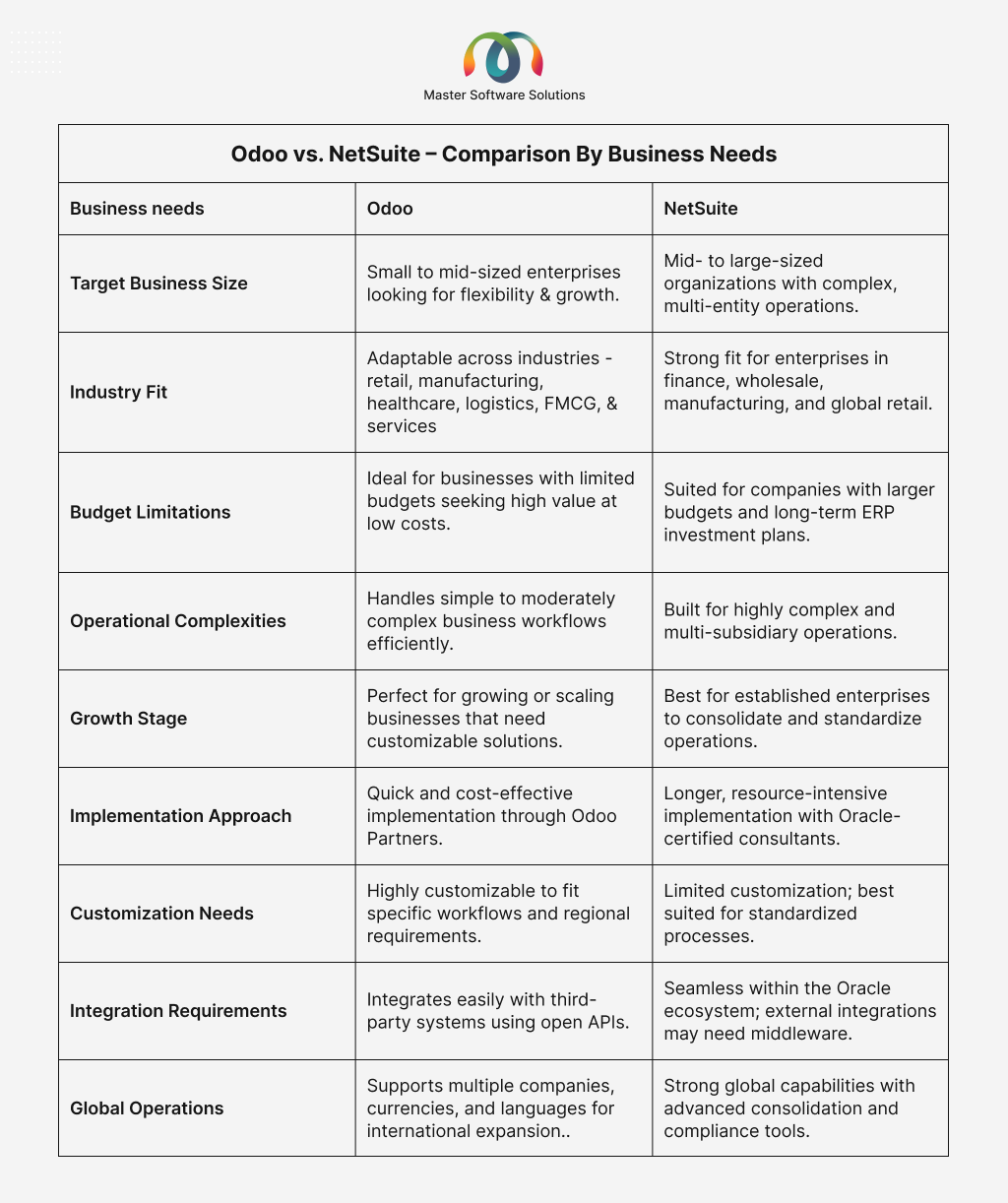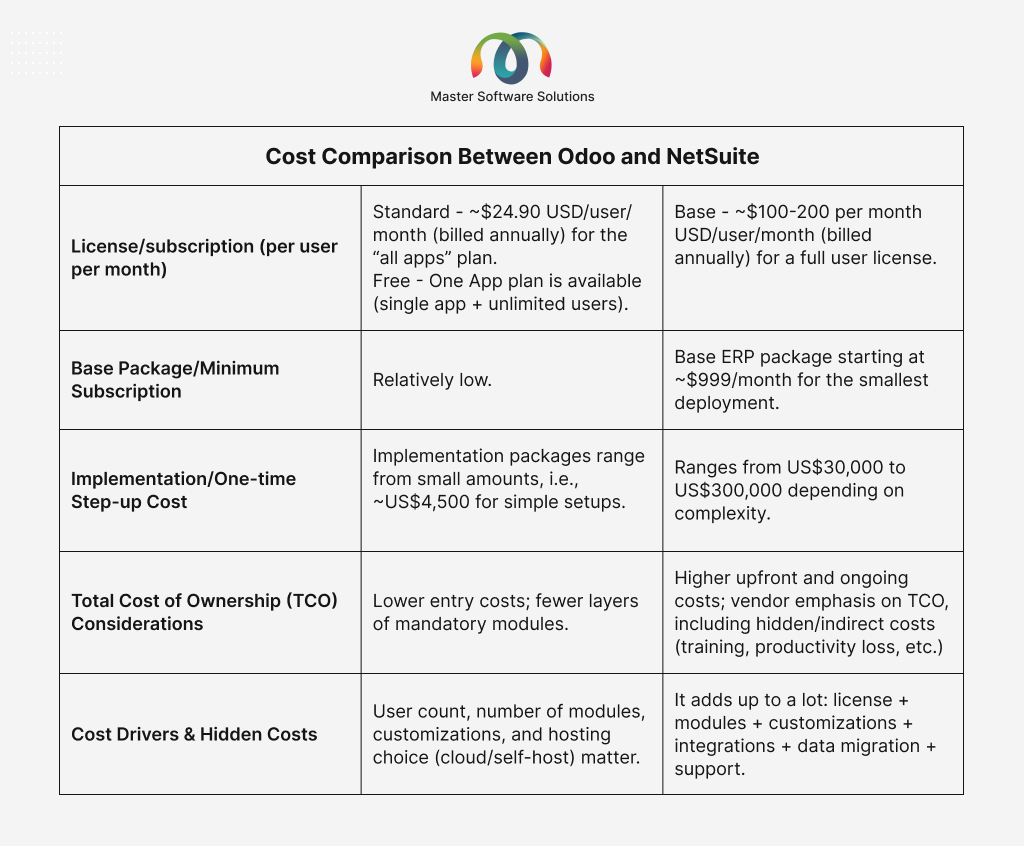Choosing the right ERP system is crucial for businesses that are looking to streamline operations, improve efficiency, and drive growth. Among the best ERP solutions in the market, Odoo and NetSuite often come up for comparison due to their robust features and global reach.
While both platforms offer comprehensive tools for managing finance, inventory, sales, and more, they differ in flexibility, customization, and cost.
Table of Contents
What is NetSuite?
NetSuite, developed by Oracle, is a cloud-based enterprise resource planning (ERP) platform that enables businesses to manage their core operations, including finance, inventory, sales orders, CRM, HR, and e-commerce, from a single integrated system. The system supports business operations for mid-sized to enterprise-level organizations.
It helps businesses automate core processes and provide real-time visibility into their operations, offering complete traceability and control.
What is Odoo?
Odoo ERP is an open-source integrated enterprise resource planning system that enables businesses to automate and streamline operations. The system offers comprehensive business management applications, including CRM, manufacturing, inventory management, e-commerce, project management, and more, to track and trace your operations.
The system is available in both a free Community version and a paid Enterprise edition that offers additional features. The Odoo ERP software supports small and large businesses, catering to their management needs.
Pros and cons of NetSuite and Odoo
If you’re unsure which one to choose, this section highlighting the pros and cons of NetSuite and Odoo will give you a clearer picture and help you make an informed decision. Both Odoo and NetSuite offer powerful features and functions; however, they come with their own set of limitations. Here are the pros and cons of NetSuite and Odoo.
Netsuite
Pros of NetSuite
- All-in-one platform – Combines ERP, CRM, inventory, HR, and e-commerce in one system, reducing the need for multiple tools.
- Real-time data and reporting – Provides powerful dashboards and analytics for faster, data-driven decisions.
- Scalable for growth – Supports multi-subsidiary, multi-currency, and multi-language operations, making it ideal for global expansion.
- Automated financial management – Simplifies accounting, billing, and compliance with built-in automation features.
- Strong security and reliability – Backed by Oracle’s enterprise-grade cloud infrastructure, ensuring data security and uptime.
- Customizable work – Offers configuration options for workflows, approvals, and reporting tailored to business needs.
- Continuous updates and support – Regularly updated and maintained by Oracle, with 24/7 cloud support and documentation.
Cons of NetSuite
- High cost of ownership – Subscription fees, add-ons, and implementation costs can be expensive for small businesses.
- Complex implementation – Requires professional setup and configuration, often taking months to go live.
- Limited customization flexibility – Deep customizations may require Oracle-certified developers and additional costs.
- Steep learning curve – The extensive features can feel overwhelming for new users.
- Dependence on the Oracle ecosystem – Integrations outside Oracle’s environment can be less seamless or require third-party tools.
- Less control over hosting – Since it’s cloud, users cannot host or manage it on their own servers.
Odoo
Pros of Odoo
- Highly customizable & modular – odoo offers over 40 main apps and thousands of community modules, allowing businesses to build exactly what they need.
- Affordable & scalable – Offers a low total cost of ownership, especially compared to other ERPs, like SAP or NetSuite. You can start small and add modules as your business grows.
- Open-source flexibility – The community version is open-source, allowing developers and partners to modify and extend it freely to meet unique requirements.
- Modern & user-friendly interface – Clean, intuitive, and web-based design that’s easy for teams to adapt.
- Seamless integrations – All Odoo modules, including Sales, Inventory, Accounting, HR, etc., are fully integrated, enabling data flow across departments.
- Global community & partner support – Supported by a larger developer community and certified Odoo partners (like our company, Master Software Solutions), providing continuous improvement and local assistance.
- Regular updates & innovations – Odoo releases a new version annually, improving performance, features, and security. The latest Odoo version is Odoo V19.
Cons of Odoo
- Complex implementation for larger setups – Large-scale deployments may require experienced partners for configuration, customization, and training.
- Limited out-of-the-box features (Community version) – Some advanced features like the studio app, IoT, or multi-company accounting are available only in the Enterprise version.
- Customization requires technical expertise – While it’s flexible, heavy customizations often require Python and Odoo framework knowledge.
- Integration with third-party tools – Though Odoo has Open APIs, connecting with some external apps may require custom connectors.
- Performance is determined by setup – On-premise or self-hosted deployments may necessitate good infrastructure and optimization to ensure smooth performance.
Odoo vs. NetSuite: feature comparison
Both Odoo and NetSuite offer comprehensive business management capabilities, and the right choice depends on your operational goals, budget, and growth plan.
Odoo is ideal for small to mid-sized businesses that value flexibility, affordability, and modular scalability. On the other hand, NetSuite suits larger enterprises looking for a robust, standardized, and globally scalable ERP system backed by Oracle’s infrastructure.
Odoo vs. NetSuite: comparison by business needs
Before committing to any of the systems, it is crucial to understand the key differentiators to align the system with your business goals.
Cost comparison: Odoo vs NetSuite
Businesses must compare the costs for implementing Odoo and NetSuite before committing to one. The actual quoted implementation costs for Odoo and NetSuite can vary significantly based on region, number of users, modules, customizations, integrations, and deployment type.
Key takeaways of this section:
- Odoo offers a more affordable entry point, especially for small- to mid-sized organizations with simpler needs.
- NetSuite tends to have a higher cost both in subscription/license and implementation, suited to larger enterprises with complex multi-entity/global operations.
- For both systems, the real cost is beyond just the license: implementation, customization, integrations, training, and change management all contribute.
- It is important to look at the 5-year or 20-year cost horizon (TCO) rather than just the initial purchase.
Which is best for your business? Odoo or NetSuite
Choosing between Odoo and NetSuite depends on your business size, complexity, budget, and growth aspirations.
Choose Odoo if
You are a small- to mid-sized business seeking an affordable, flexible ERP solution.
You require a modular system that can grow with your business.
You prefer an open-source platform with a large community and extensive customization options.
Choose NetSuite if
You are an established enterprise with complex, multi-entity operations.
You need a standardized ERP system with strong financial and compliance capabilities.
You have the budget for a higher total cost of ownership and require enterprise-grade support.
Why does Odoo stand out?s
Odoo stands out as it balances affordability, flexibility, and scalability while offering a comprehensive suite of integrated applications, making it ideal for growing businesses that need a tailored ERP solution without paying the high costs of traditional enterprise systems.
On the contrary, NetSuite supports larger organizations with deeper pockets.
Bottom-line
The right ERP implementation is critical for streamlining operations, improving efficiency, and supporting business growth. While enterprise-grade platforms like NetSuite offer features for large, complex organizations, Odoo stands out as the most flexible, affordable, and scalable solution, especially for small- and mid-sized businesses.
The Odoo ERP system empowers businesses to operate smarter, scale faster, and innovate confidently, making it the ideal ERP solution for organizations that want a customizable, cost-effective, and future-ready platform.
Master Software Solutions is an Odoo-certified partner that offers comprehensive Odoo consulting services, including implementation, configuration, integration, module development, migration, and support and maintenance services. We are continuously contributing to the Odoo community and have already developed many Odoo plugins and Modules to enhance its functionalities. Contact us to discuss your business and see how we can help.
